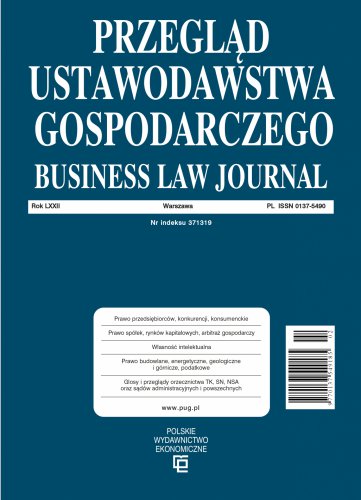Insider list in a capital group
The article presents the issue of maintaining the insider list referred to in Article 18 MAR in the capital group. The main research problem analysed by the authors is whether the provisions MAR constitute the legal basis for including the employees of the issuer's subsidiaries in the insider list maintained by the issuer (the parent company). In the authors' opinion, employees of subsidiaries having preferential access to inside information produced in a subsidiary should be considered as persons to be included in the insider list maintained by the issuer. The proposed interpretation is consistent with all views treating the capital group as a single economic unit, pursuing an interest that is essentially convergent for all participants of the group.
References
Bibliografia/References
Fennelly, N. (1996), Legal Interpretation at the European Court of Justice, Fordham International Law Journal, 20 (3), Article 4.
Hopt, K.J. (2015). Groups of Companies. A Comparative Study on the Economics, Law and Regulation of Corporate Groups, ECGI Law Working Paper, p. 286.
Hopt, K.J., & Zimmermann R. (eds), Max Planck Encyclopedia of European Private Law, Oxford: Oxford University Press.
Itzcovich, G., The Interpretation of Community Law by the European Court of Justice, German Law Journal, 10 (5).
Kinanderm, M., Ten years after: the Spector presumption in MAD, MAR and MAD II, Capital Markets Law Journal, 14 (3).
Lenaerts, K. Gutiérrez-Fons, José A. (2014). To Say What the Law of the EU Is: Methods of Interpretation and the European Court of Justice, 20 Colum. J. Eur. L., 3.
Opalski, A. (2008). O pojęciu interesu spółki handlowej [The concept of interest of partnerships and companies], Przegląd Prawa Handlowego 11, p. 16
Sołtysiński, S., Mataczyński M. (2017). In: A. Koch, J. Napierała (eds), Prawo spółek handlowych [Partnerships and companies law], Warsaw.
Rasmussen, H. (1992). Towards a Normative Theory of Interpretation of Community Law, U. CHI. LEGAL F. 135.
Rösler, H. (2012). Interpretation of EU Law. In: J. Basedow, K.J. Hopt, & R. Zimmermann (eds.), Max Planck Encyclopedia of European Private Law, Oxford: Oxford University Press.
Topór, M. (2019). Problem przepływu informacji w holdingu [The problem of information flow in holding companies], Przegląd Prawa Handlowego, 3.
Ventoruzzo, M., Mock, S. (2017). Market Abuse Regulation. Commentary and Annotated Guide, Oxford University Press, p. 397.
Judgements
Judgement of NSA [Supreme Administrative Court] in Warsaw of 24 June 2016 (II GSK 366/15).
Judgement of ECJ of 27 April 2017 in the case C-516/15 P Akzo Nobel NV and Others v European Commission, ECLI:EU:C:2017:314
Judgement of ECJ of 6 October 1982 in the case C-283/81 Srl CILFIT and Lanificio di Gavardo SpA v Ministry of Health, ECR 1982-03415.
Judgement of ECJ of 22 November 2005 in the case C-384/02 Grongaard & Bang, ECLI:EU:C:2005:708.
Judgement of ECJ of 10 May 2007 in the case C-391/04 Ypourgos Oikonomikon, Proistamenos DOY Amfissas v. Charilaos Georgakis, ECLI:EU:C:2007:272.
Judgement of ECJ of 23 December 2009 in the case C-45/08 Spector Photo Group NV, Chris Van Raemdonck v. Commissie voor het Bank, Financie en Assurantiewezen (CBFA), ECLI:EU:C:2009:806.
Judgement of ECJ of 11 March 2015 in the case C-628/13 Jean-Bernard Lafonta v. Autorité des marchés financiers, ECLI:EU:C:2015:162.

